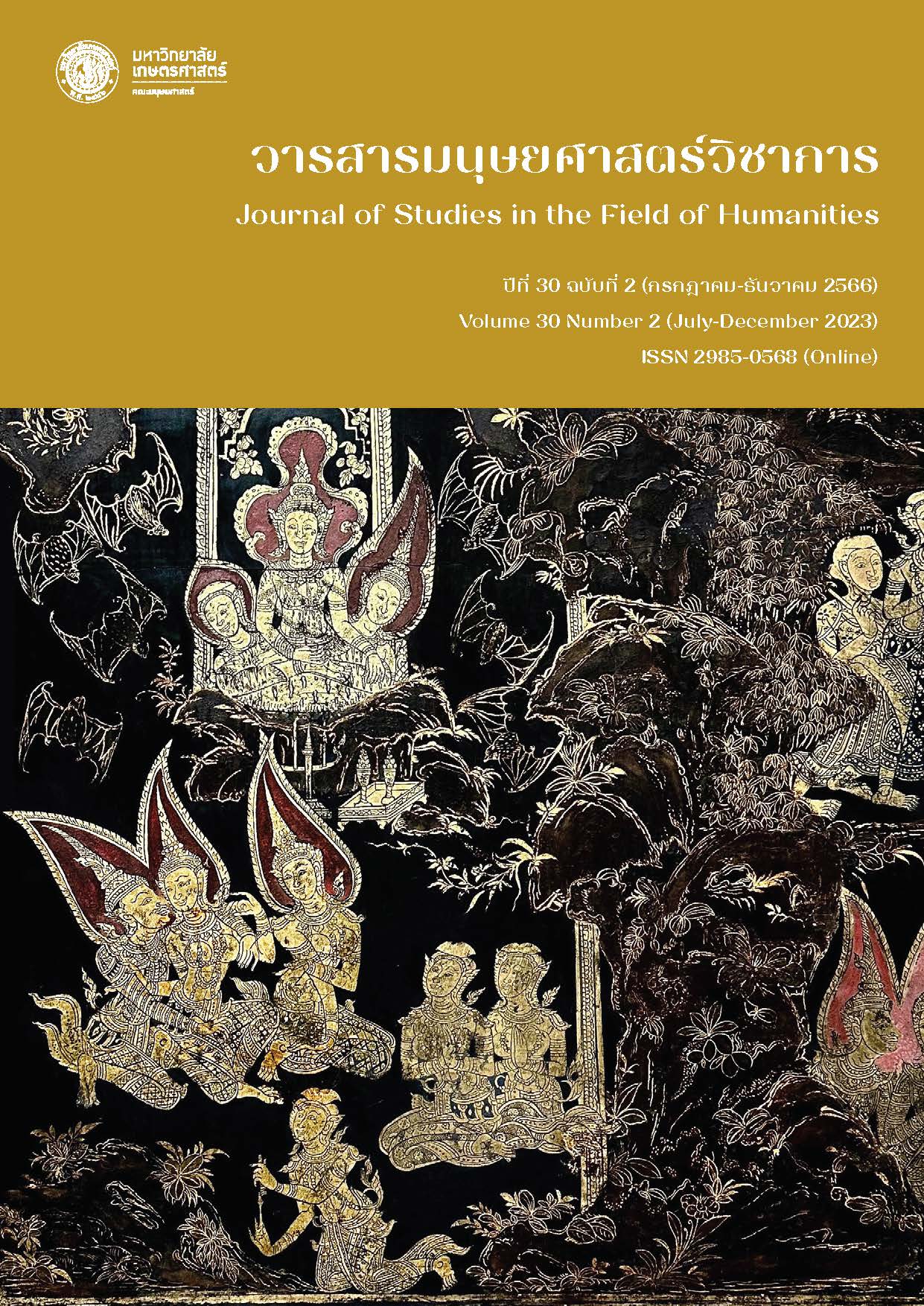An Investigation into Pronunciation Deviations in German Final Sounds among Thai YouTubers Teaching German Through YouTube
Main Article Content
Abstract
This research study aims to examine and corroborate the hypothesis that Thai individuals encounter difficulties in accurately pronouncing certain German final consonants, particularly clusters, due to the distinct phonological functions associated with these sounds. The investigation will delve into the linguistic and phonetic aspects of both languages to explore potential underlying factors influencing this phenomenon. A comparative analysis of Thai and German phonological systems will be conducted, focusing on final consonant articulation, phonetic rules, and language-specific phonotactic constraints. The outcomes of this study enhance our comprehension of cross-linguistic speech production difficulties, revealing that Thai individuals learning German encounter challenges with specific German final sounds due to variations in the phonotactic patterns of final consonants. The finding shows that some final consonant sounds are pronounced accurately, while others, like /th, kh, n, f, s, ç, x, l, sth, nth, çth, xth, t͡ʃ/, are problematic due to differences between Thai and German phonetics.
Article Details

This work is licensed under a Creative Commons Attribution-NonCommercial-NoDerivatives 4.0 International License.
References
ภาษาเยอรมันกับ Jacky. (2020. January 8). 20 ประโยคภาษาเยอรมัน | เรียนภาษาเยอรมันพื้นฐาน. [YouTube Video]. https://youtu.be/mTn-if6JYcA.
ภาษาเยอรมันกับ Jacky. (2019. October 14). 50 ประโยคภาษาเยอรมัน | ภาษาเยอรมันที่ใช้ทุกวัน | ภาษาเยอรมันในชีวิตประจำวัน. [YouTube Video]. https://youtu.be/s-PXKlig2-U.
ภาษาเยอรมันกับ Jacky. (2019. September 16). ข้อสอบพูด A1 ส่วนที่ 1 การแนะนำตัว | เรียนภาษาเยอรมัน. [YouTube Video]. https://youtu.be/yhFV23vzsak.
ภาษาเยอรมันกับ Jacky. (2019. September 19). ข้อสอบพูด A1 ส่วนที่ 2 | เรียนภาษาเยอรมัน | ข้อสอบภาษาเยอรมัน. [YouTube Video]. https://youtu.be/5XYFBWp8F1g.
เยอรมันกับครูโบ GERMAN AND BO. (2021. February 3). 10 คำถามภาษาเยอรมันเบื้องต้น A1 ง่ายๆ ไปช้าๆ - Basic GERMAN A1. [YouTube Video]. https://youtu.be/JVrneP_3Jhg.
Abenteuer Leben. (2019. September 28). Thailand für zu Hause: Thaigerichte zum Nachkochen | Abenteuer Leben | Kabel Eins. [YouTube Video]. https://youtu.be/NK5YGYOe6RI.
ABC Deutsch Udon Thani ครูเปา. (2020, April 6). เรียนภาษาเยอรมันตอนที่ 1 (พยัญชนะ และ สระ). [YouTube Video]. https://youtu.be/UO3gyyXFAEE.
ABC Deutsch Udon Thani ครูเปา. (2020, April 13). เรียนภาษาเยอรมันตอนที่ 3 (ประโยคบอกเล่า). [YouTube Video]. https://youtu.be/E-pDw7CHws8.
Attaviriyanupap, K. (2006). Ausspracheabweichungen im Hochdeutsch thailändischer Immigrantinnen in der Deutschschweiz. Linguistik Online, 26(1). https://doi.org/10.13092/lo.26.619.
Atthaphonphiphat, S. (2015). Error Analysis in English Essay Writing of Suratthani Rajabhat University’s Students with Different English Language Experiences. Journal of Humanities and Social Sciences, Suratthani Rajabhat University, 7(1), 25-52.
Atthaphonphiphat, S. C. (2017). The Production and Perception for English Final Consonant Sounds of Thai Students. International Conference on Language, Innovation, Culture & Education, 8(1), 182-191.
Baanpasa. (2019. September 12). เรียนภาษาเยอรมัน สำหรับผู้เริ่มต้น A B C. [YouTube Video]. https://youtu.be/8ZDCF3PVTL0.
Baanpasa. (2021. March 15). เฉลยข้อสอบ ความถนัดทางภาษาเยอรมัน (PAT7.2) EP.02. [YouTube Video]. https://youtu.be/SRooMO1qvE0.
Bangkok Fieber. (2021. February 19). Pad Kaprao Rezept Das Beliebteste Gericht von Thailand. [YouTube Video]. https://youtu.be/0x0U0iKhZ7Q.
Côté, M. (2004). Consonant cluster simplification in Québec French. Probus, 16(2), 151-201. https://doi.org/10.1515/prbs.2004.16.2.151.
Fuhrhop, N. & Peters, J. (2013). Einführung in die Phonologie und Graphematik. Stuttgart: J.B. Metzler.
German with Onya. (2019. October 10). ตอนที่ 1 หัดพูดเยอรมัน สำหรับคนไม่มีพื้นฐาน. [YouTube Video]. https://youtu.be/1DrqFmN9LCM.
German with Onya. (2019. October 27). ตอนที่ 2 หัดพูดเยอรมัน สำหรับคนไม่มีพื้นฐาน. [YouTube Video]. https://youtu.be/O3URCXpKDPs.
German with Onya. (2019. November 6). ตอนที่ 3 หัดพูดเยอรมัน สำหรับคนไม่มีพื้นฐาน. [YouTube Video]. https://youtu.be/oNvBKTKi5TQ.
German with Onya. (2019. December 11). ตอนที่ 4 หัดพูดเยอรมัน สำหรับคนไม่มีพื้นฐาน. [YouTube Video]. https://youtu.be/qhoOzG3QP5I.
German with Onya. (2020. January 30). ตอนที่ 5 หัดพูดเยอรมัน สำหรับคนไม่มีพื้นฐาน. [YouTube Video]. https://youtu.be/87_KP_wkVkQ.
Kanokpermpoon, M. (2007). Thai and English Consonantal Sounds: A Problem or a Potential for EFL Learning?. ABAC Journal, 27(1), 57-66.
Ketkumbonk, A. & Woragittanont, I. (2017). The Ability of Thai Students from Different English Proficiencies In Recognizing English Final Consonant Sounds. Sakon Nakhon Graduate Studies Journal, 14(64), 23-30.
Lerdpaisalwong, S. (2015). Perception Training of Thai Learners: American English Consonants and Vowels. Theses and Dissertations. University of Wisconsin-Milwaukee. https://dc.uwm.edu/etd/1009.
Nimphaibule, S. (1996). Variation of Thai Air Hostesses’ Pronunciation of the Final Consonants /tʃ/, /dʒ/, /ʃ/ in English Words. Master Degree Thesis, Linguistics Department, Faculty of Arts, Chulalongkorn University.
Pankhuenkhat, R. (2009). ภาษาศาสตร์ภาษาไทย / Thai Linguistics. Bangkok: Chulalongkorn University Press.
Pompino-Marschall, B. (2016). Cluster. In H. Glück und M. Rödel (eds.), Metzler Lexikon Sprache. Stuttgart: J.B. Metzler.
Rongwiriyaphanich, H & Charunrochan, J. (2008). Variation of /v/ in Syllable Initial and Syllable Final Positions of English Words According to Style and English- Langauge Experience of Thai Students. Rajabhat Maha Sarakham University Journal. 2(3), 45-54.
Sapp, C. D. (2019). Einführung in die deutsche Linguistik / Introduction to German Linguistics, Textbooks and Open Educational Resources. 28.6.2022. Retrieved from https://egroove.olemiss.edu/open/1.
Schmidt, A. (1997). Kollektive Zweisprachigkeit in einsprachiger Umgebung - eine wolgadeutsche Sprachinsel in Argentinien. Kiel: Westensee.
Schmidt, A. M. (1989). Aspects of Final Consonant Production in American English by Nonnative Speakers. Phonetica, 46(4), 169-180. https://doi.org/10.1159/000261841.
Smith, B. L. & Peterson, E. A. (2012). Native English speakers learning German as a second language: Devoicing of final voiced stop targets. Journal of Phonetics, 40(1), 129–140. https://doi.org/10.1016/j.wocn.2011.09.004.
Suntornsawet, J. (2022). A Systemic Review of Thai-Accented English Phonology. PASAA, 63(1), 348-370.
The Royal Institute. (2010). Lexical in Linguistics Dictionary (Applied Linguistics). Bangkok: The Royal Institute.
Wongsuriya, P. (2020). Improving the Thai Students Ability in English Pronunciation Through Mobile Application. Educational Research Review, 15(4), 175-185. https://www.semanticscholar.org/paper/Improving-the-Thai-students-ability-in-English-Wongsuriya/a2c5e4d7df597ca7fc7aa49e8f78306252940f0a.
Wright, R. A. (1996). Consonant clusters and cue preservation in Tsou. Unpublished Ph.D. dissertation, University of California, Los Angeles.
Yun, G. (2011). The Production of German Final Devoicing by Korean Speakers. 언어, 36(4), 979-1013.
Zilberman, A. (2020). How to overcome the habit of translating into the native language when learning a second language?, Retrieved from https://www.linkedin.com/pulse/how-overcome-habit-translating-native-language-when-zilberman-ph-d.


